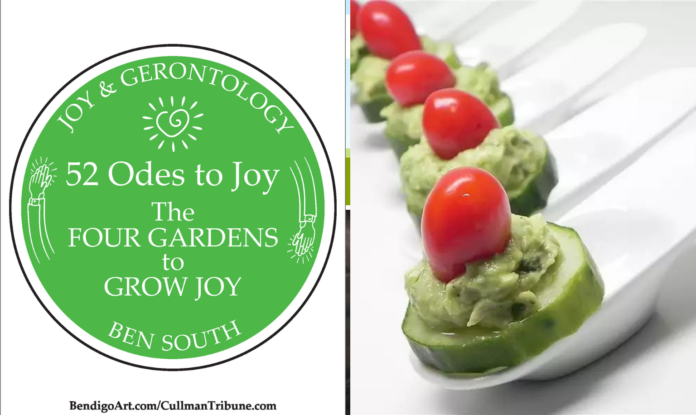AN ODE TO GARDEN JOY
A book and a glass of wine in a garden is all I need;
A sip, the sunshine, some slumber and a read.
All the planting and watering was hard work, indeed.
Now a relaxing reward—WAIT! Is that a weed?
God Almighty, according to the story in Genesis 2:8, first created man from the dirt and then because He loved His creation, “the Lord God planted a garden. Out of the ground He gave growth to every tree that is pleasing to the eye and good for food.”
Gardening has been giving humans joy since the beginning of recorded time. Octogenarian essayist Phyllis Theroux says “I think this is what hooks one to gardening: it is the closest one can come to being present at the creation.”
After four decades as a gerontologist, I heartily recommend this set of tools for enhanced positivity—a garden hoe, rake, shovel, shears and gloves. Gardening is a perfect anti-depressant. Using the four, easy-to-remember elements of “The S.U.N.S. Age Joy System” — when gardening you are: SMILE-MAKING with positive changes and positive actions, UNITING with others like a fellow garden lover or Master Gardener group, NEIGHBORING as you share your bounty and SPELLBINDING transported to “the zone” in a state of “flow.”
What is spirit-lifting, garden joy? Well-read in both theology and botanical science, the English poet Alfred Austin answered this way, “The glory of gardening is: hands in the dirt, head in the sun, heart with nature. To nurture a garden is to feed not just on the body, but the soul.”
It’s almost springtime and my fellow Master Gardeners and I are especially eager after two years of pandemic lockdown to muck about and make magnolias bloom in the mud. We joyfully agree with Lindley Karstens who says, “Gardening is about enjoying the smell of things growing in the soil, getting dirty without feeling guilty, and generally taking the time to soak up a little peace and serenity.”
There are an estimated 1,014 public gardens in the United States and millions more privately owned and maintained ones, some grand but most modest like my own. However, for increasing your likelihood to grow joy as you garden, let’s explore these:
THE FOUR GARDENS TO GROW JOY
- SMILE-MAKING GARDENS
“Coffee. Garden. Coffee. Does a good morning need anything else? —Betsy Canas Garmon
SMILE-MAKING while gardening has two aspects: POSITIVE-THINKING about the joys you experience in a garden like the beauty of a blossom or even the determination of weeds. Also, POSITIVE-DOING like the workout your body gets with all the tai-chi stretching and the heavy lifting.
Gardens delight all the senses. This can be about the goofiness of a spinning whirligig or a scarecrow in a vegetable garden, the fragrant scent of roses and lavender in a formal garden, the texture of tomato leaves in a kitchen garden, the gentle gurgle of a fountain in a sanctuary garden or the exquisite tastes of a garden-to-table luncheon.
SMILE-MAKING GARDENS include these favorites:
ROCK CITY (Lookout Mountain, TN)—Vast wooded acreage conjured as a fairyland with flower plantings and painted, garden gnomes and so much kitsch that it would make a rock smile. This tourist attraction opened in 1932 and was memorably promoted with the message “SEE ROCK CITY” painted on more than 900 barn roofs.
MONET’S COLOR GARDEN (Giverny, France)—We all find joy in the French Impressionist paintings of Claude Monet. This is where he studied color combinations. As the landscape architect William Kent said a hundred years before Monet was born, “All gardening is landscape painting.”
BUTTERFLY GARDEN & CONSERVATORY (Callaway Gardens in Pine Mountain, GA)—Plantswoman Dr. Kira Sims suggests this, “I would highly recommend Callaway Gardens in the spring, especially for those who love azaleas and dogwoods. It’s just breath-taking to see…in their perfect environment, filtered sun beneath a stand of pines.”
- UNITING GARDENS
“I’ve always felt that having a garden is like having a good and loyal friend.”—C.Z. Guest
“Plant and your spouse plants with you; weed and you weed alone.”—Jean Jacques Rousseau
UNITING is about the deep connections that gardening allows us. Day after, mostly enjoyed, day my parents worked together in their large, ornamental gardens for years after both retired from teaching careers. Mom had the creative vision to imagine a half-acre, fan-shaped garden, segmented in five slices which were populated with plants dear to each of their five children and our family. Together, with very little hired help, created and maintained the gardens. They planted the peripheral arc of the “family fan garden” with a dense hedge of Nellie Stevens hollies which eventually grew to 20’ high. This was to create a windbreak for the butterflies who thronged to the garden to sip on the nectar plants. It was thought to be the largest, privately owned butterfly garden in Alabama. Gardening provided this productive duo a source of joy together and supported their six decades of marriage.
UNITING GARDENS include these favorites:
RAISED BED GARDENS—These are terrific for loved seniors and other-abled persons in your life. There are easy building/planting/maintaining instructions online.
CONTAINER GARDENS—You may not have the time to take on even a small garden plot with someone else, but you could still delight someone with a good-sized pot or urn planted with ornamental grasses and cascading, peppery petunias. Remember to allow for drainage and provide a bit of instruction on watering.
HEART-SHAPED GARDEN and PLANTS—Hearts are a long-established symbol for the joy of uniting. I remember a “Dick and Jane” story in first grade that was about those beloved characters planting a small, heart-shaped flower bed as a surprise for Mother’s Day. There are also many common, affordable plants with heart-shaped leaves you might consider: String of Hearts, cyclamens, philodendrons and anthuriums for indoor valentines, and Jack Frost, Redbud Hazel, Bleeding Heart, hostas, Grandpa Ott (beautiful, blue climber), Northern Catalpas, Silver Linden and Henry’s Lime for outdoor valentines.
- NEIGHBORING GARDENS
“A society grows great when old men (and women) plant trees whose shade they know they shall never sit in.”—Greek proverb
“Garden sharing” is an others-centered concept where a landowner allows someone to garden on the landowner’s property. It’s been practiced since people started owning claims to land. The National Gardening Association estimates more than 2 million Americans each year communicate this “sharing is caring” message with their neighbors, friends and family.
The first plant growers were thriving as early as 10,000 BC in the aptly named “fertile crescent” of the Middle East, but the first gardens demarcated from farming are thought to have been created by the slaves as ordered by the Egyptian ruler, King Ramses III.
American garden history has Mediterranean roots from the Ancient Greeks and Ancient Romans. Ultimately, the pilgrims are credited with bringing seeds and practices to our shores in order to survive and help their neighbors survive in self-imposed exile. Add in native plants like tomatoes and peppers and it brings everything to a neighborly harvest-to-home table today.
NEIGHBORING GARDENS include these favorites:
TEACHING/DEMONSTRATION GARDENS—Just this week, in our Master Gardens Demonstration Garden we shared the best techniques and tools for pruning. We want our neighbors to prune effectively for more food, better use of natural resources and for the uplifting joy of being around beautiful plant-life.
GLEANING—The book that popularized the “Love Thy Neighbor” phrase also provides instruction on the neighboring love of gleaning. I learned about gleaning from the collaborative work of the North Alabama Agriplex (Cullman, AL) and The Society of St. Andrews. In a nutshell, or on a post-harvest fruit/vegetable farm, gleaning is allowing neighbors to collect the remainder of crop bounty. Oft-times, these are apples, sweet potatoes and such deliciousness that are deemed too unattractive for retail. The gleaned harvest is donated to feed neighbors who come to food banks and soup kitchens.
GROW-A-ROW—Vegetable gardening is darned hard work. As gardener/writer, Lou Erickson, said “Gardening requires lots of water—most of it in the form of perspiration.” If you’re motivated to grow a few rows for yourself and your family, it simply feels joyful to grow another row to share with your neighbors.
- SPELLBINDING GARDENS
“My garden of flowers is also my garden of thoughts and dreams. The thoughts grow as freely as the flowers and the dreams are as beautiful.”—Abram L. Urban
“If you never experience the joy of accomplishing more than you can imagine, plant a garden.”—Robert Breault
Gardening guru, Dr. Kira Sims of the Alabama Cooperative Extension System (Cullman County), who wrote her doctoral dissertation on weeds, shared these words of wisdom with me this week: “Joy in gardening comes from being able to escape the busyness of our lives and hone in on one simple task like pulling weeds. Gardening gives the freedom of thinking about nothing else but the task at hand, whether it’s raking leaves, pulling weeds or planting seeds. Joy in gardening also comes from observing and participating in the circle of life. As we plant seeds, take precious care to nurture the plants and reap the reward of eating the crop (or view the ornamentals), we experience that process of life, death and life again. So much joy can be found in gardening, so slow down, smell the roses and enjoy the life and peace a garden can bring.” (ACES sponsors the Alabama Master Gardener program.)
Some gardens are designed to mesmerize. Let’s mind-meld with the spellbound visitors who have been transported to the dream world—gardening wizard, Le Notre, materialized at Versailles. Recently, I had taken a break from writing about gardens and met with my Master Gardener, mentee, Teri Mobley. She and I both gushed about the fountains and topiary each of us had seen at Versailles. But, coming back to earth, Teri also talked about the magic of feeling “grounded,” that spellbinding pleasure of being entranced in the moment of digging in the dirt. Palatial gardens like those at Versailles are magical but less grandiose designs like corn mazes and losing track of time mowing and edging are spellbinding as well.
SPELLBINDING GARDENS include these favorites:
–“Corn Maze Near Me—Best Corn Mazes in Every State,” this is the headline from a popular article in “Parade Magazine” (August, 2020). Yes, apparently Alaska has two corn mazes and the 40-acre corn maze in Dixon, CA holds the “Guinness World Record” for the largest.
–FLOWER CARPET (Brussels, Belgium)—Every summer since 1971, volunteers convene at the Grand Palace to weave 19,000-square feet, magical carpet of more than a million begonias. This is on my “Gardens Bucket List.” Google Images for this real-but-fantastical magic.
Looking for tools to add more joy to your life? They’re in the garden shed. Plant what makes you smile. Unite with a gardening pal. Share your bounty with your neighbors. And, be spellbound with GARDEN JOY.
JOY-GIVERS CELEBRATING A BIRTHDAY THIS WEEK
Feb. 26—Levi Straus
Feb. 27—Marian Anderson
Feb. 28—Frank Gehry
March 1—Justin Bieber
March 2—Dr. Seuss
March 3—Alexander Graham Bell
March 4—Antonio Vivaldi
GARDEN JOY JOKES
“Have others’ gardening skills improved during the pandemic? Early on, I planted myself on the sofa and have grown significantly.”
“One of my fellow Master Gardeners is Jewish and his azaleas look awful. He told me he fears the soil is too Hasidic.”
“What’s the best part about gardening? Getting down and dirty with your hoes.”
CALIFORNIA AVOCADO GARDEN PARTY APPETIZERS
(Source: allrecipes.com)
Each week, Joy & Gerontology shares a recipe saluting healthy food produced in America. The delicious and nutritious collection is called “The S.U.N.S. USA Longevity Cookbook” and highlights vitamin B-3 (niacin) which many research gerontologists believe holds the promise for a long, healthy, joyful life.
INGREDIENTS
1 ripe, California avocado
½ cup fresh basil leaves
1 Tablespoon lime-juice
1 clove garlic
¼ teaspoon salt
¼ teaspoon ground black pepper
1 cucumber, cut into ¼-inch rounds
1 cup cherry tomatoes, sliced in halves
1 Tablespoon yogurt
DIRECTIONS
Step 1) Blend avocado, basil, lime juice, garlic, salt and pepper together in a food processor or blender until smooth.
Step 2) Spread avocado mixture onto each cucumber slice and artfully top with a cherry tomato slice and a dab of yogurt.
1,070 JOY-GIVING THINGS FROM MY FIRST 70 YEARS (continued)
184. Electric-powered Weed-eaters.
185. Captain Kangaroo.
186. The Captain and Tennille.
187. Miss Manners.
188. “Do be a Do Bee. Don’t be a Don’t Bee.”
189. The paintings of Helen Frankenthaler.
190. Sitting beneath a frame watching a quilt being stitched.
191. Picking cotton to earn spending money.
192. “The Many Loves of Dobie Gillis.”
193. The Magic Slate.
194. Wiping the slate clean.
195. “No matter what shape your stomach is in.”
196. “The Cell Block Tango.”
197. Sleeping baby.
198. Beer for breakfast in Los Angeles.
199. The smell of mom’s new Oldsmobile.
200. Penny loafer with beef rolls.
201. Tassel loafers.
202. Calling BINGO numbers at the nursing home.
203. Chartering the Delta Queen steamboat.
204. Kentucky Derby.
205. Sponsoring a NASCAR driver and team.
206. Seed catalogs.
HAPPY MARCH and SPRINGTIME GARDEN JOY!




























